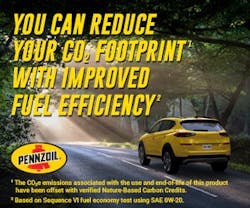Imagine the sustainability effect of being able to remove the carbon dioxide emissions of 340,000 cars from the road for an entire year.
Shell Lubricants is on track to do just that. The company is planning to offset 700,000 tonnes of carbon dioxide equivalent (CO2e) emissions per year through their ongoing sustainability efforts. In addition to efforts to avoid and reduce emissions, the company is offsetting remaining emissions through Shell Nature-Based Solutions, an international portfolio of projects which protect, transform or restore land to help nature absorb more CO2 emissions from the atmosphere.
“Shell has drawn the line in the sand and said that we really want to be aggressive in the sustainability space,” Patty Lanning, General Manager of North American Marketing at Shell Lubricants, says.
A Mission to Sustainability
Shell has been on a sustainability journey for many years, but began to put a strong effort in the mission in 2016. The company is now aiming to be a net-zero emissions business by 2050, or sooner in step with society and their customers.
“It's important that we (Shell) play our part,” Lanning says. “We've been in the energy business for 125 years and we want to continue to be on this journey for many years to come, so we know we need to be a part of the solution.”
The path to becoming more and more sustainable is a large priority to Shell, and the efforts can be seen in all facets of the company—nationally and internationally.
“We're going through a shift right now, and that transition to a low carbon energy future really requires a lot of different solutions,” Lanning explains. “From a Shell Lubricants perspective, we’re focusing on avoiding, reducing, and then offsetting in order to help us meet our goals.”
The Push to Carbon Neutral Products
The company has integrated carbon neutral products into their existing Pennzoil Platinum full synthetic product portfolio as one of many solutions to help ensure they continue to provide the same performance or protection benefits of their current products. These 0W motor oils are inherently more fuel efficient, and offsetting any remaining emissions helps customers and consumers be more sustainable. Some of these products include Pennzoil Platinum 0W-20 and 0W-16 Full Synthetic Motor Oil, Pennzoil Ultra Platinum 0W-40 and 0W-20 Full Synthetic Motor Oil, Pennzoil Platinum High Mileage 0W-20 Full Synthetic Motor Oil, and more.
The company’s sustainability mission is present throughout the Pennzoil Platinum Carbon Neutral portfolio, even down to the product packaging.
“Our bottles are made up of 25 percent recyclable materials, and we're already starting to migrate to 40 percent for different packaging options,” Lanning says.
But for Shell Lubricants, their sustainability emphasis goes beyond the products themselves. Shell Nature-Based Solutions comprises all efforts related to their sustainability mission including the protection, creation, or redevelopment of natural ecosystems in order to lower concentrations of greenhouse gases.
Nature-Based Solutions, Beyond the Bottle
The company is reducing carbon emissions of their supply chain through optimizing their transportation and improving energy efficiency of their facilities; for example, more than 50 percent of electricity used in Shell Lubricant Blending Plants now comes from renewable sources. Shell is avoiding emissions by designing products with reduced greenhouse gas (GHG) and less packaging; for example, EcoBox, used in the US is an alternative to traditional plastic packaging for motor oil for light-duty vehicles which can reduce plastic usage in the packaging by more than 80 percent1 and CO2e emissions by more than 60 percent. Only then does Shell Lubricants offset remaining emissions from the lifecycle of their products by protecting and restoring natural ecosystems.
“Shell Nature-Based Solutions encourage the redevelopment of forests, grasslands, and wetlands,” Lanning explains. “We are working alongside local governments, accredited third parties, and other key stakeholders to help develop activities that can support the biological capture and storage of carbon.”
The journey towards sustainability is admittedly a long one, but Shell is dedicated to progressing along with customers to become more sustainable in the next 30 years—and beyond.
To learn more about Pennzoil’s commitment to sustainability, please visit pennzoil.com/sustainability.
1Over 80% plastic reduction in box liner vs 5 individual 5QT Pennzoil bottles.
